The Power and Passion of African Drum Performances
African Drum Performances are more than just music; they are a vibrant expression of culture, history, and community. From the rhythmic heartbeat of the djembe to the intricate polyrhythms of the talking drums, these instruments carry stories, traditions, and emotions that have echoed through generations.
An Introduction to the World of African Drums
African drums are not just instruments; they are vessels of communication, storytelling, and cultural preservation. Each drum, with its unique shape, size, and materials, possesses a distinctive voice. From the resonant bass of the ngoma to the high-pitched clicks of the shekere, the diversity of African drums reflects the rich tapestry of African cultures.
The Importance of Rhythm in African Culture
Rhythm is the lifeblood of African music and culture. The pulsing beat of the drums acts as a unifying force, bringing people together in communal celebrations, spiritual ceremonies, and everyday life. The rhythms are often complex and intricate, weaving together layers of polyrhythms, call and response patterns, and syncopation.
The Significance of Drum Performances in African Society
Drum performances play a crucial role in African societies, serving a variety of functions:
- Ceremonial Events: Drums are integral to traditional ceremonies, including weddings, funerals, harvest festivals, and initiation rites. The rhythmic patterns and drum calls communicate specific messages, invoking ancestors, honoring deities, or celebrating life transitions.
- Storytelling: Drums are powerful storytelling devices. The different sounds and rhythms create a rich tapestry of narratives, passed down through generations. The talking drums, in particular, can mimic human speech, conveying messages and stories through complex rhythms.
- Social Cohesion: Drumming is a communal activity that brings people together, fostering a sense of belonging and shared identity. Drum circles and performances are spaces for community building, social interaction, and cultural transmission.
- Spiritual Expression: Drums are believed to have spiritual power in many African cultures. The rhythms can be used to invoke spirits, connect with the ancestors, or enter a state of altered consciousness.
The Art of Drumming: Technique and Mastery
Learning to play African drums requires patience, dedication, and a deep understanding of the rhythms and traditions. Experienced drummers master complex techniques, including:
- Hand Positioning: Different hand positions on the drum head produce different sounds.
- Stick Techniques: Sticks and mallets are used to create a variety of percussive effects.
- Polyrhythms: Creating multiple rhythms simultaneously, adding complexity and depth to the music.
- Call and Response: Drums interact with each other, creating a dialogue of sound and rhythm.
“Learning to play African drums is like learning a new language,” says renowned drummer Baba Wendo. “It’s about understanding the rhythms, the emotions, and the stories behind the music.”
Exploring the Diversity of African Drum Traditions
The world of African drum performances is as diverse as the continent itself. Each region and ethnic group has its unique drumming traditions, influenced by history, geography, and cultural beliefs.
West Africa: Known for its vibrant and energetic rhythms, West African drumming traditions feature instruments like the djembe, the tama, and the dununba.
Central Africa: Central African drum traditions often focus on complex polyrhythms and intricate patterns. The balafon, a xylophone-like instrument, often accompanies the drums.
East Africa: East African drumming traditions are often characterized by their strong, driving rhythms, used for both ceremonial purposes and social gatherings.
Southern Africa: Southern African drumming traditions are often characterized by their use of animal hide drums and unique rhythmic patterns. The mbira, a thumb piano, is also an important instrument in this region.
The Influence of African Drums on Global Music
African drum traditions have had a profound impact on global music, influencing styles like jazz, funk, rock, and pop.
The Power of the Beat: The rhythmic foundation of much modern music can be traced back to African drumming traditions.
Global Fusion: African drummers have collaborated with musicians from around the world, creating a rich and dynamic fusion of musical styles.
Experiencing the Magic of African Drum Performances
If you have the opportunity to witness an African drum performance, you’re in for a treat. The power and passion of these performances are truly captivating, transporting audiences to a world of rhythm, spirit, and cultural richness.
Tips for Attending an African Drum Performance:
- Respect the Culture: Observe the traditions and etiquette of the specific culture hosting the performance.
- Feel the Rhythm: Allow yourself to be swept up in the music and move your body to the beat.
- Engage with the Performers: Applaud and cheer enthusiastically to show your appreciation.
FAQ
Q: What are some of the most popular African drum instruments?
A: Some of the most popular African drum instruments include the djembe, the tama, the dununba, the ngoma, and the shekere.
Q: Where can I learn to play African drums?
A: You can learn to play African drums by taking classes at a local music school, joining a drumming circle, or finding a private instructor.
Q: What are some good examples of African drum music?
A: You can find many examples of African drum music online, on streaming services, and on YouTube.
Q: What are some famous African drummers?
A: Some famous African drummers include Babatunde Olatunji, Sekou Kouyate, and Baba Wendo.
Embrace the Rhythms of Africa
African drum performances are a window into a rich and vibrant culture. Whether you’re a music enthusiast, a cultural explorer, or simply seeking a unique and powerful experience, embrace the rhythms of Africa.


